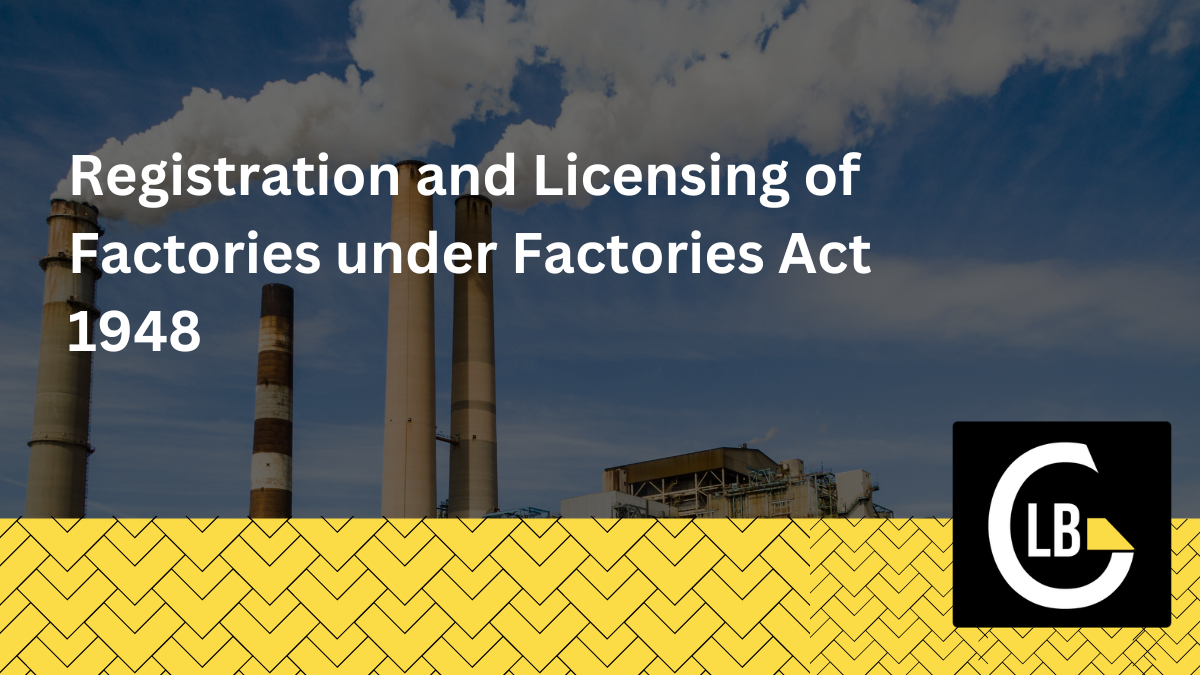If you’re planning to set up a factory in India, there are some important steps you need to follow to operate legally. The Factories Act, 1948 ensures that factory workers are provided with safe and healthy working conditions, and it lays down the rules for registering and licensing factories.
In this guide, we’ll walk you through the process of registering and licensing your factory under this law in simple, easy-to-understand language.
What is the Factories Act, 1948?
The Factories Act, 1948, is a law that governs working conditions in factories in India. It aims to ensure worker safety, health, and welfare. This law applies to:
- Factories that use power and employ 10 or more workers
- Factories that do not use power but employ 20 or more workers
If your factory fits into either of these categories, you are required to register the factory and obtain a license to legally begin operations.
What is Factory Registration and Licensing?
Factory registration is the process of getting your factory listed with the local government. You’ll also need a factory license, which proves that your factory meets all the necessary safety and welfare standards as required by law.
Without completing this process, it is illegal to run a factory in India.
Why is Registration and Licensing Necessary?
There are several important reasons why registration and licensing are required:
- It’s the law: You need to be registered and licensed before you can operate your factory.
- It protects workers: These rules help ensure that the factory environment is safe and that workers’ rights are protected.
- Avoid penalties: Not following the registration process can result in heavy fines or even the closure of your factory.
- Ensures government oversight: Registration makes it easier for the government to monitor and improve factory conditions across the country.
How to Register and License Your Factory: Step-by-Step
Let’s break down the process of registering and licensing your factory step-by-step under the Factories Act, 1948.
1. Collect All Necessary Documents
Before you can apply for registration, you’ll need to gather some key documents. These typically include:
- Factory layout plan: A detailed drawing that shows the factory’s design.
- List of machinery: Information about all machines that will be used in the factory.
- Details about the workforce: The number of workers and their roles in the factory.
- Ownership or lease documents: Proof that you own or lease the land or building where the factory will be located.
2. Submit the Application
Once you’ve collected the necessary documents, you need to submit an application to the Chief Inspector of Factories or the State Inspector of Factories. This application will include:
- The location and size of the factory
- The number of workers you plan to employ
- Information about the production process you’ll use
- A description of the safety measures and facilities for workers
The application will need to be submitted along with the required fees, which vary depending on the size and type of factory.
3. Factory Inspection
Once your application is submitted, local authorities will inspect the factory to ensure it meets the safety and welfare standards laid out in the Factories Act. They’ll check for:
- Proper ventilation, lighting, and sanitary conditions
- Fire safety equipment and emergency exits
- Availability of protective gear and first-aid kits for workers
4. Approval and Licensing
If your factory passes the inspection and complies with all regulations, you’ll be granted a factory license by the Chief Inspector of Factories. This license is your official approval to start operating your factory. Typically, the license is valid for one year and needs to be renewed regularly.
5. Renewal of Factory License
To continue operating legally, you’ll need to renew your factory license before it expires. The renewal process requires submitting a renewal application along with the required fee. It’s important to renew on time to avoid any legal issues or penalties.
Key Points to Remember
- Register Before Starting Operations: You need to complete the registration process before you start running your factory. Operating without a license can result in penalties.
- State-Specific Rules: While the Factories Act is a central law, each state in India may have slightly different rules for registration and licensing, so make sure you follow your state’s specific guidelines.
- Renew Your License on Time: Always renew your license on time to avoid fines or disruptions in factory operations.
Conclusion
The Factories Act, 1948, is designed to ensure that factories provide safe working conditions for their employees. Registering and licensing your factory is an important legal step, ensuring you meet safety and welfare standards.
By following the registration and licensing process correctly, you can avoid penalties, create a safe work environment, and ensure that your factory operates smoothly under the law.
